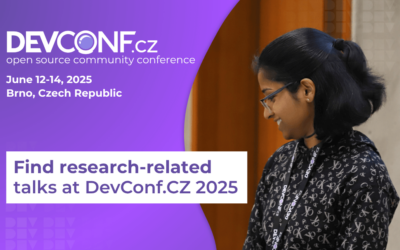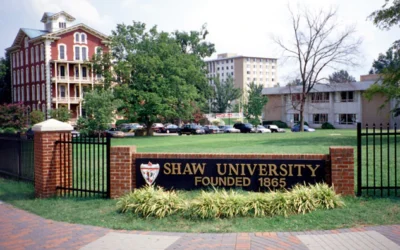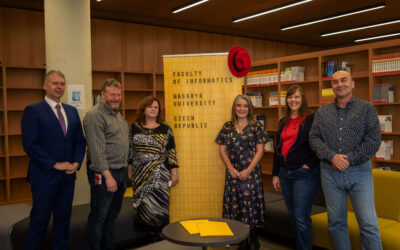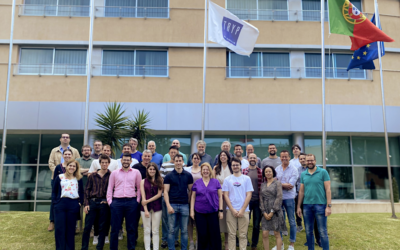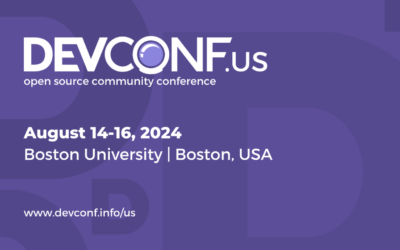DevConf.CZ 2024 , held June 13-15 in Brno, features a packed agenda with talks on AI and data science, IoT and edge computing, security and cryptography, DevOps, and much more. As usual, many presentations feature the work of Red Hat Research and our research partners. Check out the list below for research-related highlights, and see the full schedule at the DevConf.CZ website.
Why attend DevConf.CZ?
DevConf.CZ is the biggest event for developers, administrators, and users of Linux and open source in Central Europe. The annual event launched in 2009 and hasn’t missed a year since, going virtual from 2020-2022. DevConf has always been about open source and community projects, and it has a long tradition of being welcoming to everyone, including those who don’t usually attend conferences. You can attend online or in person, and registration and attendance are free.
Red Hat Research-related talks at DevConf.CZ
Understanding program performance: when academia meets the practice
Speaker: Tomas Fiedor, Brno University of Technology, FIT
Abstract: The results of academic analysis of software performance are always interesting, but applying techniques in practice can be complicated. In this talk, we will summarize our experience and the challenges we faced when moving from the academic field into the real world.
The talk will also focus on Perun: a performance management system and a tool suite we have developed over the past seven years. We have evaluated our techniques on smaller or medium-sized projects (at most, a half million lines of code). Now, we’ve decided to move towards a bigger challenge: the Linux kernel.
The computing continuum: IoT-edge-cloud
AC3: A collaborative, open source Horizon Europe research project focused on an AI-driven, sustainable, cloud-edge infrastructure
Speakers: Ben Capper and Ryan Jenkins, Red Hat
Abstract: AC3 is an innovative open source EU research project focused on cloud-edge infrastructure with deep AI integration and efficient energy consumption. AC3’s AI-driven decision making is vital for allowing developers to focus on creating applications rather than operations and maintenance. This is achieved by providing a zero-touch and proactive approach to lifecycle management and is enabled through detailed resource profiles and real-time monitoring.
During this session, we’ll explore how the Roque de los Muchachos Observatory, partnered with the University of Madrid, exploits the AC3 infrastructure to store and process massive amounts of data using advanced techniques. These functions are provided by application microservices containerized and strategically placed on a range of environments, from cloud to far edge.
Cognitive Decentralized Edge to Cloud Orchestration (CODECO): a Horizon Europe open source research collaboration project
Speaker: Alka Nixon, Red Hat
Abstract: CODECO, short for Cognitive Decentralized Edge to Cloud Orchestration, is an innovative open source framework aiming to boost Edge-Cloud infrastructure efficiency and infrastructure resilience. It focuses on optimizing application deployment and runtime within Kubernetes environments through cognitive and cross-layer orchestration, spanning data flow, computation, and network layers. CODECO provides a comprehensive view of data in the IoT-edge-cloud continuum.
This talk targets stakeholders keen on advancing Edge-Cloud orchestration. Attendees will grasp CODECO’s principles, objectives, and key research contributions and come away with knowledge of open source toolkits, training resources, and use-case deployments. We will highlight an example deployment of the CODECO framework in the smart city of Göttingen, showcasing impressive energy efficiency and the leveraging of AI via edge cloud devices to enable smart solutions.
[Find out more about CODECO in the news article “Edge and cloud computing conference spotlights CODECO decentralized edge-cloud orchestration”]
INCODE: A collaborative, open-source Horizon Europe research project, creating a programming platform for deployments on edge and IoT environments
Speakers: Paul Power and Clodagh Walsh, Red Hat
Abstract: INCODE is dedicated to advancing the IoT to edge to cloud computing continuum and simplifying application deployment on IoT devices. The INCODE platform includes the necessary infrastructure for deployments across the continuum. The platform has access to various domains including 5G and RAN networks, a network fabric, and a cloud platform. Furthermore, through the device registration framework, developers can seamlessly integrate IoT devices into the centrally managed pool of resources.
Join us for a discussion of ongoing research efforts. The potential of the INCODE platform will be highlighted through two use cases: the collaboration of drone and ground vehicles in search and rescue efforts and monitoring the operators in a manufacturing facility through an exoskeleton and sensors. This talk is of particular interest to DevOps engineers.
Security and cryptography
Deep dive into PQ transition
Speakers: Sahana Prasad and Dmitry Belyavski, Red Hat
Abstract: As we stand at the cusp of the quantum computing era, the fragility of traditional cryptographic systems has become increasingly evident. To this end, the Post Quantum (PQ) transition is already a reality. In this talk, we will introduce QUBIP, a project funded by the EU that is engineering the PQ transition.
The talk is in two parts. In part one, we will cover the following: What is the PQ transition and why is it relevant to the open source community? What are the open source components and standards involved? What is the current status in Red Hat and Fedora, and what are the future plans?
In part two, we will introduce QUBIP and its goals, talk about the various partners involved and their specific roles, and share the project’s current status and future plans. Part two will also feature a demo of the working PQ algorithms in Fedora.
[Find out more about QUBIP in “QUBIP and the transition to post-quantum cryptography,” RHRQ 5:4, Feb. 2024.]
Sec-certs.org: security certification insights you won’t find anywhere else (link to conference schedule coming soon)
Speaker: Matej Matuška, Red Hat
Abstract: Security certificates like Common Criteria and FIPS are supposed to certify that our software and hardware are secure. But how many products are certified? How long does the certification take? Which provider is the best? You’d be surprised to learn that engineers in compliance don’t know, because a single, comprehensive database with metadata didn’t exist.
The talk will introduce sec-certs, a tool for semi-automated analysis of the certificate dataset. It is created by automatically downloading and processing all available metadata and PDFs and cross-referencing them together. This enables data-backed business insights on certificates, labs, processes, and the whole certification ecosystem that were not previously available.
[Learn about the development of sec-certs in the article “A data-driven approach to analyzing Common Criteria and FIPS 140 security certificates,” RHRQ 5:1, May 2023.]
Education
A university course aimed at Linux kernel development
Speaker: Rado Vrbovsky, Red Hat
Abstract: Getting into Linux kernel development is not an easy task. The code base is complex, the documentation is lacking and behind the code development, and the knowledge to contribute is mostly contained within the active developer community itself.
Starting in Fall 2024, Red Hat will bring to Masaryk University a for-credit course aimed at students who want to break through the initial knowledge barrier and cross the gap between academia and the Linux industry. The class will cover introduction to kernel development process, understanding of kernel subsystems, and writing your own device drivers. Join us to learn more about this course, which is running for its 4th iteration in the US, and tap into the tribal knowledge of the kernel community.
[Learn more about this program in the blog post “Kernel Development Learning Pipeline program brings Linux to college students.”]
Tutors Simulator: a foundation for live social presence on a successful open learning experience platform
Speaker: Colm Dunphy, Red Hat
Abstract: In 2022, TutorStack, an open source project supported by staff in Red Hat Waterford and academics and students from SETU, was presented remotely at DevConf. The talk demonstrated a Learning Experience Platform designed to engage with students proactively, facilitating early interventions for online students struggling silently. However, there was no way to demonstrate social presence features of the open source Tutors platform live without releasing sensitive data (GDPR).
Since then, the tutors.dev open source community has quadrupled utilizing Holopin digital badging. It supports over 150 active programs across multiple universities on four continents. On the road to enhancing and growing social presence features, we have built Tutors Simulator to address the privacy issues, using AI generative tools and frameworks on top of a tech jamstack including node.js, typescript, Svelte, and partykit. In Tutors Simulator, courses are real and open, people are not.
Join us for a demonstration of Tutors Simulator, including a technical walkthrough and a visualization of our future social presence plans. We especially invite educators, developers, and documentation writers to join and contribute to tutors.dev success.
My experience with teaching beginners
Speaker: Martin Zelený, Red Hat
Abstract: How to spread basic IT knowledge around the world? Find the community to volunteer! As a lecturer in the Czechitas organization and PyLadies community, I will share what it is like to teach Python programming and Linux command line.
[Learn more about PyLadies in “PyLadies, welcome to open source!” RHRQ 2:4, Feb. 2021.]

